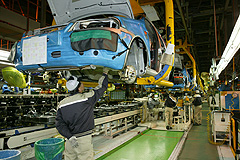News - DaewooGM Daewoo seeks vital cashBrave face: GM Daewoo president and CEO Michael Grimaldi launches the new Lacetti in Seoul. Holden's South Korean car-maker in "critical" condition but optimistic about loans7 Apr 2009 GM DAEWOO – in which Australia's GM Holden is the majority shareholder – is looking to banks and the South Korean government to overcome what it describes as a "critical" cash-flow period in the second quarter after exhausting a credit line of more than $3 billion. However, the embattled South Korean company remains optimistic of overcoming the liquidity crisis with the help of its major creditor, the government-run Korea Development Bank (KDB). KDB is also a major shareholder in GM Daewoo, as well as a lender, but the car-maker said it does not want the bank to boost its equity in the company. GM Daewoo Auto & Technology president and CEO Michael Grimaldi said at the Seoul motor show last Thursday the company had requested additional loans from banks, including KDB. “As we get into the second quarter, our cash-flow becomes critical, but we are watching and we are taking action as necessary to get through this period,” said Mr Grimaldi. “We are currently in discussions with our bank, KDB. We are sharing with them our plans on what we intend to invest in. “I am optimistic that over this period, working with the KDB, we will find an appropriate approach to help GM Daewoo.” However, reports out of Seoul suggest that KDB has shown little interest in providing the one trillion won ($A1.04 billion) of financial help that GM Daewoo is believed to be seeking.  GM Daewoo's Bupyeong plants, South Korea. GM Daewoo's Bupyeong plants, South Korea.Mr Grimaldi said that no money raised in South Korea would be sent abroad to help the company’s ailing parent, GM, which is considering bankruptcy protection in the US. “Any funds that we do receive from KDB or the Korean government would be for GM Daewoo in Korea,” he said. Reuters reports that South Korean government officials have said GM must clearly explain its plans for GM Daewoo in the US auto giant’s restructuring process before asking for their help. Seoul has not announced direct financial aid measures such as liquidity injection to automakers yet. GM Daewoo argues that its operations are financially independent from GM and run as standalone, so would not be affected by any restructuring at GM. Holden became the controlling 44.6 per cent shareholder in GM Daewoo as a result of GM’s takeover of the South Korean car-maker in 2002. GM subsequently increased its share to 50.9 per cent in 2005. Mr Grimaldi reiterated GM Daewoo’s previously stated plan to invest a total 2.5 trillion won ($A2.61 billion) in 2009 and 2010 for new products, but may have to consider further manufacturing cuts. GM Daewoo’s sales fell 43.8 per cent to 135,489 vehicles in the first quarter while its vital exports – which account for 80 per cent of production – fell 45.1 per cent. A union official at a protest rally outside the show said GM Daewoo’s main plant at Bupyeong, which has had numerous down days since December, could soon cease production for 13 days, forcing the company to lay-off 1000 temporary workers. Meanwhile, South Korea’s smallest car-maker SsangYong remains in the hands of a court-appointed manager and is expected to hand down an auditor’s report on its viability on May 6. Yesterday, a local newspaper reported that SsangYong planned to cut about 40 per cent of its workforce, dropping the number of employees from 7200 to fewer than 4400. |
Click to shareDaewoo articlesMotor industry news |














Facebook Twitter Instagram